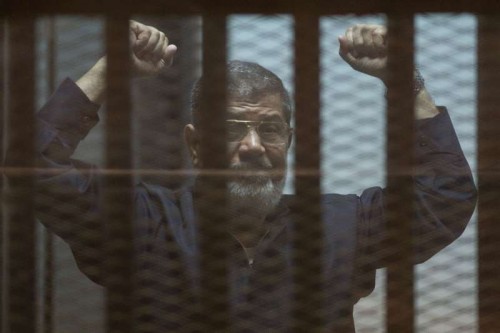
An Egyptian court sentenced former president Mohamed Morsi to death over a 2011 prison break case, confirming a preliminary death sentence issued in May.
A probe led by Judge Hassan Samir Qadhi found the defendants in the jail break case plotted the killing of police personnel in Abu Zaabal, Wadi el Natroun and El Marg prisons and released around 20,000 prisoners, according to MENA news agency.
The Cairo Criminal Court also sentenced to death Muslim Brotherhood guide Mohammad Badie, his deputy Rashad Bayoumi, Brotherhood guide office lawyer Mohei Hamed, former parliament speaker Saad Katatni and Brotherhood leader Essam el Erian in the jail break case.
The six convicts attended the verdict session which was held at the police academy in Tagmmu el Khamis district.
Earlier in the day, Morsi was also sentenced to life imprisonment related to charges of espionage for foreign powers – including Hamas, Lebanon’s Hezbollah and Iran’s Revolutionary Guards – to destabilise Egypt, Al Ahram daily reported.
The court also sentenced 17 defendants to life in prison, and 16 to death, including Muslim Brotherhood leaders Khairat El-Beltagy and Mohamed El-Beltagy.
The general guide of the Muslim Brotherhood, Mohamed Badie, was sentenced to 25 years in jail in the spying case.
On May 16, the court issued a preliminary death sentence against Morsi and 105 other defendants in the jailbreak case, after which their papers were referred to the grand mufti, a senior Muslim cleric, for a consultative review as required by Egyptian law.
The mufti’s advice regarding the death sentence is not legally binding. The death sentence can be appealed.
In the Wadi Natroun jailbreak case, the prosecution charged Morsi and 130 co-defendants, many tried in absentia, with damaging and setting fire to prison buildings, murder, attempted murder, looting prison weapons depots, and releasing prisoners while escaping from the prison during the January 2011 revolution.
According to the prosecution, the prisoners who escaped include members of the Muslim Brotherhood, Hamas, and Hezbollah, as well as jihadis and criminals.
Prosecutors said over 800 fighters from Gaza had infiltrated Egypt and used rocket-propelled grenades and weapons to storm three prisons, abducting four policemen and killing several others.